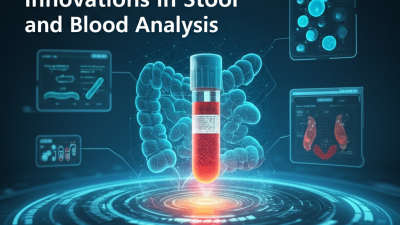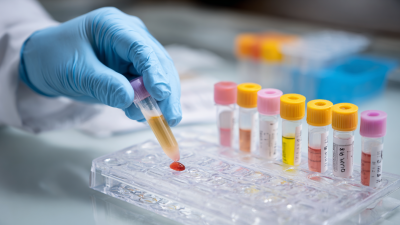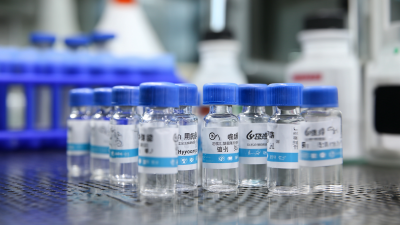The Future of H Pylori Testing Innovations in Stool and Blood Analysis
Table of Contents
- Advancements in H Pylori Testing Methods: Stool vs Blood Analysis
- Understanding the Role of Stool Tests in H Pylori Detection
- Blood Tests for H Pylori: Accuracy and Implications
- Comparative Analysis: Stool Testing vs Blood Testing for H Pylori
- Emerging Technologies in H Pylori Diagnosis
- Future Trends in H Pylori Testing: What to Expect
- FAQS
- Conclusion
- Related Posts
Hey there! So, you probably know that Helicobacter pylori, or H. pylori for short, is a bacteria that can cause some pretty serious issues in your stomach and digestive system. Getting accurate tests done really makes a big difference when it comes to diagnosing and treating these problems.

Lately, there have been some pretty exciting breakthroughs in how we test for H. pylori—especially using stool or blood samples. These new methods are really changing the game in diagnostics, making things faster and more reliable. In this guide, we’ll take a close look at the latest and greatest in these testing techniques, and why they matter so much for patient care and making healthcare work smoother.
By the way, Jiangsu Macro & Micro-Test Med-Tech Co., Ltd., has been leading the charge on these innovations since they started back in 2010. With a real focus on R&D, they’re all about developing new detection tech and in vitro diagnostic reagents—driven by fresh ideas and top-notch manufacturing.
So, come along as we explore what the future holds for H. pylori testing and how it’s really transforming clinical diagnostics!
Advancements in H Pylori Testing Methods: Stool vs Blood Analysis
Lately, there’ve been some pretty exciting breakthroughs in how we test for H. pylori, and honestly, it’s changing the game when it comes to diagnosing this common stomach infection. In the past, doctors mainly used stool tests and blood tests, but each has its pros and cons when it comes to accuracy and comfort. These days, stool tests are getting pretty popular because they’re non-invasive — no needles, no fuss — making things much easier for patients. Plus, newer stool testing methods use advanced molecular techniques that can detect H. pylori antigens faster and more reliably, which is a big win for diagnosis.
On the flip side, blood tests, which to be honest aren’t everyone's favorite because they involve drawing blood, are also getting better. Recent improvements in serological tests mean they’re more specific and sensitive than before. They look for antibodies against H. pylori, giving doctors a good idea if someone has a long-term infection. That said, they don’t always tell you if the infection is current or in the past, which is a bit of a limitation. As research continues, experts are actually looking into combining these different testing methods to improve accuracy and help patients get better, more tailored treatment for stomach issues linked to H. pylori.
Overall, it’s a pretty exciting time in the world of diagnostics, with tech advancing to make things smoother and more reliable for everyone involved.
The Future of H Pylori Testing: Stool vs Blood Analysis
This chart illustrates the advancements in H Pylori testing methods through stool and blood analysis over the years. As technology evolves, the accuracy and efficiency of these tests improve, impacting diagnosis and treatment.
Understanding the Role of Stool Tests in H Pylori Detection
Stool tests have really become a go-to method when it comes to detecting
Helicobacter pylori (H. pylori).
You know, that pesky bacterium linked to all kinds of stomach issues like ulcers and gastritis.
Recently, there have been some pretty cool advancements in stool analysis—making these tests more
accurate and reliable than the old-school methods we used to rely on.
According to the American Gastroenterological Association, stool antigen testing can reach up to
95% sensitivity and over
90% specificity, so doctors consider it a solid choice
for diagnosing this infection.
Now, if you’re wondering about the benefits of stool tests versus blood tests, here’s the scoop:
blood tests look for antibodies, which can stick around long after you've cleared the infection.
But stool tests are different—they detect actual antigens, meaning they tell you if the infection
is currently active. That’s pretty important for getting the right treatment at the right time.
A few tips for anyone getting tested:
- Timing matters—make sure you haven't taken antibiotics or proton pump inhibitors for at least two weeks before the test, because those can mess with the results.
- Talk to your doctor—it’s a good idea to discuss which test is best for you, since your personal health situation might influence the choice.
- Follow up—if your stool test comes back positive, don’t forget to chat with your doctor about treatment options and whether you need more tests to confirm the infection’s gone.
Getting tested can feel a bit overwhelming, but understanding these details really helps you stay on top of your health!
Blood Tests for H Pylori: Accuracy and Implications
Helicobacter pylori, that little bacterium often tied to stomach inflammation and ulcers, has been a main focus when it comes to figuring out the best ways to test for it. Blood tests for H. pylori have really been the go-to method because they’re quick and don’t involve any invasive procedures—pretty convenient, right? These tests look for antibodies the body makes against the bacteria, giving us a fast hint if someone’s infected. But, of course, there’s been quite a bit of debate among healthcare folks about how accurate these blood tests really are and what they mean for patient care.
Now, the truth is, the accuracy of blood tests isn’t set in stone; it can vary depending on things like when the sample was taken and how the person’s immune system is responding at the time. They’re great for quick results, no doubt, but they’re not perfect. Sometimes, they can give false positives or negatives, which is why doctors often recommend confirming the results with other tests, like stool antigen tests or even a scope with an endoscopy. Looking ahead, there’s some pretty exciting stuff happening—like new, more sensitive blood tests and biomarkers—that could make diagnosis way more reliable. If these advancements keep progressing, we might get a much better handle on H. pylori infections, leading to more targeted treatments and, hopefully, better outcomes for patients.
Comparative Analysis: Stool Testing vs Blood Testing for H Pylori
You know, the fight against Helicobacter pylori, or H. pylori, has come a long way, especially when it comes to testing methods. When doctors need to figure out if someone has it, they usually go for either stool tests or blood tests — both have their own pros and cons.
Stool testing is pretty popular because it’s non-invasive — you just need to send a sample of your poop, and bam, results come back pretty quickly. Plus, it’s pretty accurate, which makes it a favorite among many docs.
On the flip side, blood tests look for antibodies your body makes in response to H. pylori. They’re really easy to run and can give quick results too. The catch is, blood tests might miss early infections sometimes — giving a false negative — or show a false positive if you’ve had the infection in the past. So, it’s kinda all about picking the right test based on your medical history and how at-risk you are. As technology keeps improving in this area, knowing the differences between these methods will be super helpful for getting the right diagnosis and planning treatment. It’s not always straightforward, but understanding these options definitely makes a difference.
Emerging Technologies in H Pylori Diagnosis
You know, new technologies popping up for diagnosing H. pylori are really changing the game for healthcare pros trying to find and treat these infections. The old-school methods, like the breath tests and endoscopies, are still pretty reliable, but they can be a pain — uncomfortable for patients and not always easy to access. Luckily, lately, there’s been some exciting progress with stool and blood tests that are less invasive, faster, and more patient-friendly. These new options let doctors get results quicker and make the whole experience a lot smoother for patients.
One cool new development is the highly sensitive stool tests that can detect H. pylori antigens with pretty impressive accuracy. They use advanced molecular techniques, so even tiny infections can be spotted. Blood tests are also getting better, with new serological assays that give faster results and are simpler to do. Thanks to these innovations, healthcare providers can keep a closer eye on infections and manage them more effectively — which ultimately leads to better outcomes for patients.
Future Trends in H Pylori Testing: What to Expect
As researchers get a better grasp of Helicobacter pylori (or H. pylori for short), which is basically a chronic bacterial infection linked to a bunch of stomach issues, we're starting to see some pretty exciting new testing methods pop up. Looking ahead, it seems like the focus will be on more non-invasive ways to diagnose — things like stool and blood tests are definitely the stars of the show now.
These stool tests are getting smarter, aiming to be more accurate and quicker, making life easier for doctors who need to diagnose and keep tabs on infections without making patients go through unnecessary hassle. Plus, they're using some pretty advanced tech—think CRISPR and next-gen sequencing—to detect H. pylori with much better precision.
On the blood test side, things are shifting too. New biomarkers are being studied to not just tell if someone has H. pylori but also to gauge how severe it might be. And here's the cool part: artificial intelligence and machine learning are making their way into analyzing these blood samples, potentially giving doctors predictive insights that can help them come up with better, more personalized treatment plans.
All in all, these advances mean testing will become more patient-friendly and tailored to individual needs, hopefully leading to better outcomes when it comes to managing gut health stuff.
FAQS
: Helicobacter pylori is a bacterium linked to gastric inflammation and ulcers, making it a significant target for effective testing methods in diagnosing related conditions.
Blood tests for H. pylori detect antibodies against the bacterium, providing a rapid indication of infection through serological testing.
Blood tests may have varying accuracy, influenced by factors like sample collection timing and individual immune responses, leading to potential false positives or negatives.
Stool testing is non-invasive, allows easy sample collection, and has high sensitivity and specificity, making it a preferred diagnostic choice for many clinicians.
Blood tests may produce false negatives in early infections or false positives for individuals who have had past infections, highlighting the need for confirmatory testing.
New stool tests are being developed with advanced molecular techniques for high sensitivity, while blood tests are improving with faster turnaround times and easier procedures.
They provide non-invasive and efficient testing alternatives, leading to quicker results, enhanced patient comfort, and better management of H. pylori infections.
Stool antigen tests and endoscopy are recommended as confirmatory methods due to their more direct approach to detecting H. pylori infections.
Enhanced blood analysis techniques may improve diagnostic precision through more sensitive assays and biomarkers, leading to better-targeted treatments.
Choosing the appropriate testing method is crucial, as it depends on the patient's clinical history and risk factors, which affects the overall accuracy of the diagnosis.
Conclusion
H. pylori testing has come a long way lately, with some pretty exciting updates in both stool and blood testing methods. These days, stool tests are really gaining popularity — they’re non-invasive, straightforward, and pretty good at detecting an infection. They give you a pretty clear idea if the bacteria is present, which is pretty impressive. On the other hand, blood tests have been around longer, but they might not always be as accurate or specific. As technology keeps moving forward, new innovations are popping up that could make these tests even better, hopefully leading to better outcomes for patients.
Jiangsu Macro & Micro-Test Med-Tech Co., Ltd. is doing some cool stuff in this space, focusing on research and bringing fresh diagnostic tools to the table. Their work is really shaping how these tests might improve in the future. Moving forward, understanding the differences between “H. pylori stool tests” and “blood tests” is going to be super important for doctors and patients trying to figure out the best approach for diagnosis and treatment.
Related Posts
-

Solutions for Effective Detection of Helicobacter Pylori with Innovative Testing Kits
-

Future Trends in Gene Cyp2c19 Market Analysis for 2025 and Beyond
-

The Future of Rapid Testing Solutions for Malaria Wholesale Suppliers
-

Understanding the Cost Factors for Wholesale Fish Blood Testing in Your Business
-

Exploring the Features and Applications of Cervical Cancer Self Test Kits: A Comprehensive Guide
-

Discover Top-Quality Hpylori Test Solutions from Premier Chinese Manufacturers

